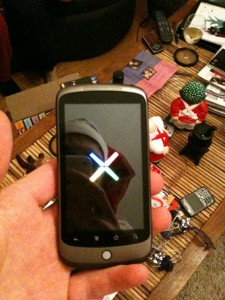Nexus One 'Google phone' gets US green light

The US telecoms regulator has approved an HTC handset that is widely believed to be an Android device currently being tested internally at Google.
On Monday, the Federal Communications Commission (FCC) published documentation for a phone labelled as the Nexus One. Two days previously, Google product management vice president Mario Queiroz wrote in a blog post that the company had given its employees an Android device to test over the coming holiday period.
"We recently came up with the concept of a mobile lab, which is a device that combines innovative hardware from a partner with software that runs on Android to experiment with new mobile features and capabilities, and we shared this device with Google employees across the globe," Queiroz wrote. "This means they get to test out a new technology and help improve it."
Queiroz said specific product details could not be shared with the public, as the "dogfooding" process — where a company tries out its own product before officially launching it, known as 'eating your own dogfood' — was "exclusively for Google employees".
A Google spokesman told ZDNet UK on Tuesday that "not everything that gets dogfooded makes it to a public launch". Asked whether a handset that has gained FCC approval was likely to be released, he said: "It tends to, yes."
In the past, Google has released two so-called Dev Phones, which are versions of commercial Android handsets that are given to developers unlocked. The first was a version of the T-Mobile G1, while the second was a version of the HTC Magic. Like the popular Motorola Droid (known in Europe as the Milestone), both were 'Google Experience' handsets, in that they carry Google branding and receive regular over-the-air updates.
Google's spokesman would not confirm whether the new HTC handset was a third Dev Phone. However, he did note that all the previous Dev Phones had received FCC approval and had "been released to the market subsequent to the consumer version".
"If [the Nexus One] were a Dev Phone, it would be the other way round [from how the company had approached the process in the past]", Google's spokesman added.
The last few days have seen a rash of speculation over the nature of the new 'Google Phone', largely kicked off by Twitter posts from Californian marketer Cory O'Brien (including a photo of the purported Google Phone), Google open-source program manager Leslie Hawthorn ("ZOMG we had fireworks and we all got the new Google phone. It's beautiful") and CNET podcast producer Jason Howell ("...I just had my hands on the Google Phone. I feel so privileged!").
Much of the speculation has involved the idea of Google designing and launching its own unlocked Android handset, rather than releasing the device in conjunction with mobile operators, which has been the norm until now.
However, according to Gartner mobile analyst Carolina Milanesi, Google "would be a bit silly to bring anything to market on their own and enter into direct competition with Motorola, HTC and everyone else who's been backing Android".
"That's not how you nurture an ecosystem, by competing with the very people that you are trying to get on board," Milanesi told ZDNet UK on Tuesday. She added that not even Apple — a company whose brand she thinks is stronger than Google's among consumers — tried to launch the iPhone without operator involvement.
Milanesi said it was more likely that Google had seeded its employees with the new device, which reportedly runs the as-yet-unreleased Android version 2.1, in order to take more control over the platform's development. Recently, Android handsets have been coming out with a variety of versions — for example, the currently available Droid uses version 2.0.1, while the upcoming Sony Ericsson X10 will launch with version 1.6.
"If [the device referred to in Google's blog post] was a phone, maybe the concern that Google has at the moment is that there is already a lot of fragmentation, with the vendors doing their own thing," Milanesi said. "We've not seen a lot since the G1 that's the full Google Experience. Maybe Google is a little bit concerned about that and is trying to help that overall Google Experience further."
Milanesi suggested that Android 2.1 was likely to be "the next big release" of the open-source software stack, and a release that would "stabilise the platform". She said it made sense to ready Google employees and developers for that release, to make sure version 2.1 comes "rich with applications".
"So far, Google has being quite passive as far as marketing goes," Milanesi said. "It hasn't really advertised. The recommendation we made for application-store owners is that they need to take ownership of their advertising. So far, Google has been happy to leave it for vendors — maybe they want a more active role in trying to push that side."
